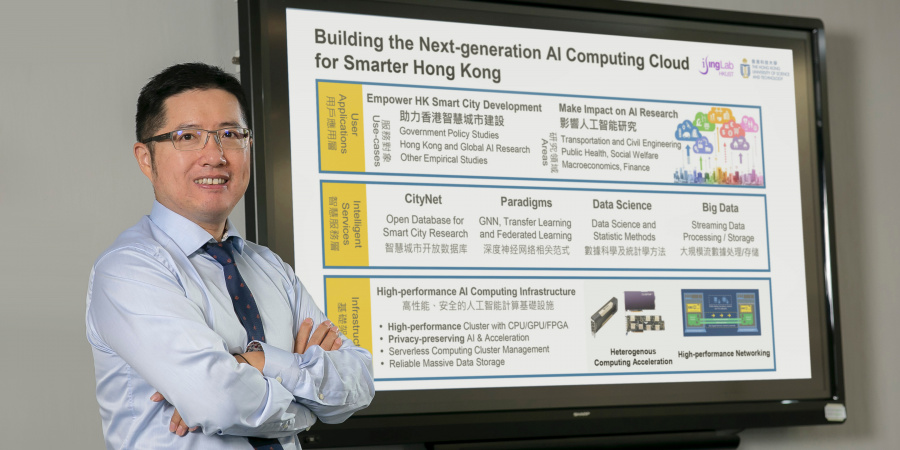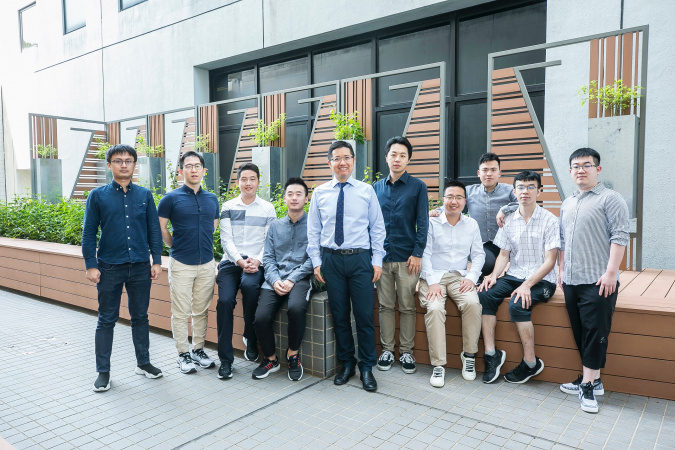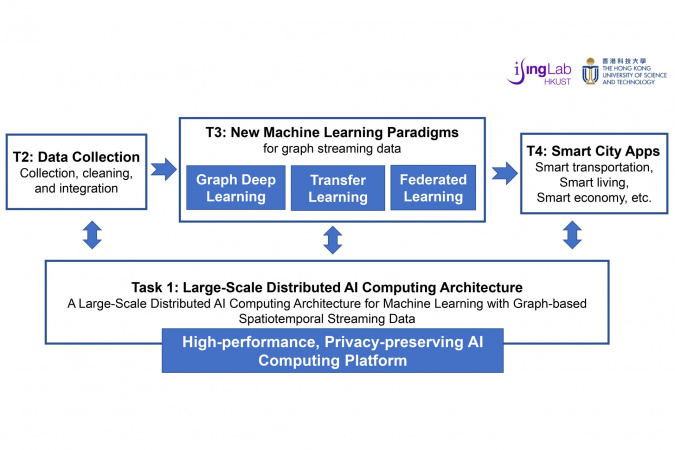Prof. CHEN Kai Designs Next-Generation AI Computing Hub and Sets New Paradigm
Prof. CHEN Kai, Associate Professor of Computer Science and Engineering (CSE), excels in building big projects from scratch. Born and bred in rural China, he is now the brain behind what will become Hong Kong’s ‘brain’ in future – the next-generation artificial intelligence (AI) computing hub for the entire city that encompasses smart bus schedules, taxi dispatch, typhoon warning, medical diagnoses, fintech and others. As the key scientist collaborating with the government to set up the IT infrastructure for Hong Kong’s smart city development, the professor is setting a new paradigm for the decades to come.
Setting new paradigm for Hong Kong’s AI hub
Hong Kong’s Smart City Blueprint, announced by the government in 2017, aims at using innovation and technology to address urban challenges, enhance effectiveness, and improve quality of living and sustainability. It covers smart mobility, smart living, smart environment, smart people, smart government, and smart economy.
Awarded Research Grants Council’s Theme-based Research Scheme funding in July this year, Prof. Chen is working with the government to build the infrastructural core of the city’s AI hub. Leveraging on his high-performance distributed machine learning framework for graph-based streaming data with smart city applications, Prof. Chen will lead his research lab, intelligent System Networking (iSING), to conduct research on the next-generation AI computing hub. The hub will enable researchers and practitioners to participate in data collaboration through a high-performance privacy-preserving computing platform that will drive Hong Kong’s smart city applications.
His brainchild, the next-generation AI computing hub for smarter Hong Kong, boasts the benefits of having high performance and privacy preservation. “Firstly, there is high performance as we can handle big data within short time frames, often reducing work duration from weeks to days or even hours for certain processes. This is done by training up our models with data analytics and machine learning. Secondly, there is privacy preservation as we use encryption to enable technologies that can learn from data and do so without disclosing identities in relation to the data.”
Take hospital data for instance. Whereas individual hospitals need to protect data of their own patients, there is need for the medical community to combine data from different hospitals to enlarge the sample size for research. To address hospitals’ concerns, Prof. Chen and his team deploy advanced encryption technologies such that data can be combined to establish machine learning models for collective learning and disease diagnoses. Most importantly, the encrypted data somehow never leave individual hospitals. This is a milestone in privacy preservation. The same principle applies to financial services across banks.
His AI-enabled smart city infrastructure and applications, with millions of nodes to represent different entities and locations including buildings and road intersections in continuous data streams, have the advantage of enhancing efficiency and convenience. Currently working with the Transport Department and the Hong Kong Observatory, Prof. Chen’s team has collected massive spatial-temporal graph-based city data in various aspects. These data can be leveraged by deep neural networks such as graph convolutional networks to build powerful models for different smart applications. Planning to apply their machine learning methodology to optimize the Hong Kong transportation system, the team’s research can be applied to the reduction of waiting time and traffic jam by smart bus scheduling, flexible rearrangement of directions regarding traffic lanes during rush hour, as well as prediction of passenger hot spots for taxi dispatch.
With the government grant, Prof. Chen will continue to build the mega AI system with data center and cloud computing capacities to drive transportation optimization, healthcare, fintech and other areas for the entire Hong Kong. Prior to this, he had been building the system in his lab with his students and had generated impact in Google, Nvidia, Huawei etc with their designs adopted. “I have been building the system since as early as 2012 when I joined HKUST, and it involves time-consuming research on hardware, software, design, theories and implementation. We now anticipate that this AI computing platform system will be open to HKUST faculty by 2021, and to all local universities by 2022. It will ultimately be adopted by the whole city.”
Pioneer in AI
As a young professor barely in his late 30s, how did Prof. Chen rise to the important position he is assuming now?
Born and bred in a small village with only seven families in Anhui province in Mainland China, he had learned to be persistent and resilient since a young age. “From my village, I had to walk 10km, or two hours every day across a small mountain to go to school in town and return home. My family used to raise goats for meat to be sold in the market, and I played with the goats after school. My dad was a teacher. I was aware of my sensitivity to numbers when I was young. For example, I can remember the 11-digit phone numbers by just looking at them once.”
When he was a teenager in the 1990s, his parents took him for a short trip to Shanghai. The experience of going to a big city for the first time became a memorable episode in his life and sowed the seeds for studying abroad later. “Growing up in a rural village surrounded by big mountains, I was extremely excited and impressed when I saw the contrasting scene in the modern city full of skyscrapers and people. I learned that the world is colourful and it inspired me to go out and explore when I grew up.”
Always coming first in class, the hardworking and outstanding student later became one of the only two in his junior middle school to be promoted to a prestigious senior high school in his province. He then went on to the University of Science and Technology of China in Anhui’s capital Hefei for bachelor’s and master’s degree studies in computer science. “At that time, computer science was becoming popular and I foresaw that it would be very useful. Also, my interest in math and sensitivity to numbers provided a solid foundation for my studies.”
He attained his goal of seeing the world when he pursued doctoral studies, also in computer science, at Northwestern University in Chicago, US between 2007 and 2012. In late 2008, he read one of the first papers about data center and cloud computing just as the emerging field was beginning to become popular. “I was very interested and I knew it would become huge and influential,” he said. He has been pursuing this topic ever since. No wonder he refers to his time at Northwestern as an experience that changed him a lot.
In August 2009, one month after his first child was born, he went from Chicago to Beijing’s Microsoft Research Lab for a three-month internship. Feeling most inspired and returning to the US in the Fall, he was so fascinated that he worked for several months non-stop, even during Christmas and New Year when there was no one else in the university’s computer laboratory, to write a paper on data center. His efforts paid off and the paper was accepted by the flagship conference in the field, ACM SIGCOMM, as a Best Paper Candidate in August 2010 when he was still a PhD student. The achievement of publishing his paper in an international conference, known for its extremely low acceptance rate, marked a turning point in his life.
“My wife was very supportive; she sacrificed a lot to make that happen,” he said. Today, he talks about his three children, aged 11, eight and one, with a big, happy smile. He has also continued to contribute to the conference with the first two homegrown papers from Hong Kong in ACM SIGCOMM 2016. He explained the challenge behind his research. “Unlike theory research, research on data center and cloud computing requires a lot of time to build a real system using many computers. So it could take two to three years to build one system for one paper.” (To learn about the hard work behind, read the article on the CSE Department’s WeChat public account.)
As one of the few who started working on data center and cloud computing back in 2008 and who continues to work on cutting-edge research, he is now the Executive Vice-President of the Hong Kong Society of Artificial Intelligence & Robotics (HKSAIR). With Hong Kong’s AI and robotics research quickly developing and receiving lots of government attention, he hopes to accelerate the process by contributing to high-performance AI infrastructure that lays the foundation for faster applications, algorithms, and models.
Setting goals
The professor finds HKUST a quiet and peaceful place for research, which is also conveniently located near urban hubs. “As the best university in Asia, HKUST has one of the top computer science and engineering departments and engineering schools. I enjoy the mix of Asian and Western cultures, the academic and research environment as well as the beautiful campus here. I can easily visit my parents in my hometown in China.”
Being diligent and target-oriented, Prof. Chen encourages young people to set goals. “Falling in love with and pursuing data center and cloud computing research since 2008, I can tell from my personal experience that one has to follow one’s passion. It is important to set goals at different stages and work towards them. Work hard, and never give up.”



